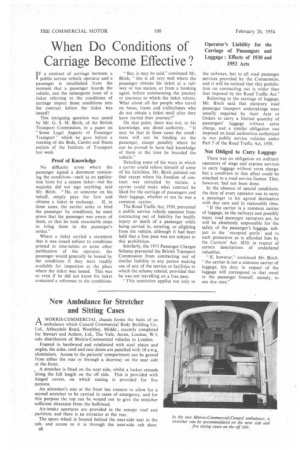When Do Conditions of Carriage Become Effective?
Page 42

If you've noticed an error in this article please click here to report it so we can fix it.
I F a contract of carriage between a public service vehicle operator and a passenger is established from the moment that a passenger boards the vehicle, can the subsequent issue of a ticket referring to the conditions of carriage import those conditions into the contract before the ticket was issued?
This intriguing question was posed by Mr. G. S. M. Birch, of the British Transport Commission, in a paper on Some Legal Aspects of Passenger Transport" which he gave before a meeting of the Beds, Cambs and Hunts section of the Institute of Transport last week.
Proof of Knowledge
No difficulty arose where the passenger signed a document containing the conditions—such as an application form for a season ticket—but the majority did not sign anything, said Mr. Birch. "He, or someone on his behalf, simply pays the fare and obtains a ticket in exchange. If, in these cases, the carrier seeks to bind the passenger by Conditions, he must prove that the passenger was aware of them, or that he took reasonable steps to bring them to the passenger's notice."
Where a ticket carried a statement that it was issued subject to conditions printed in time-tables or some other publication of the operator, the passenger would generally be bound by the conditions if they were readily available for inspection at the place where the ticket was issued. This was so even if he did not know his ticket contained a reference to the conditions. "But, it may be said," continued Mr. Birch, "this is all very well where the passenger obtains his ticket at a railway or bus station, or from a booking agent, before commencing the journey or journeys to which the ticket relates. What about all the people who travel on buses, trams and trolleybuses who do not obtain a ticket until after they have started their journey?"
On that point, there was not, to his knowledge, any direct authority. "It may be that in these cases the conditions will not be binding on the passenger, except possibly where he can be proved to have had knowledge of them at the time he boarded the vehicle."
Detailing some of the ways in which a carrier could relieve himself of some of his liabilities, Mr. Birch pointed out that except where his freedom of contract was curtailed by statute, a carrier could make what contract he liked for the carriage of passengers and their luggage, whether or not he was a common carrier.
The Road Traffic Act, 1930, prevented a public service vehicle operator from contracting out of liability for bodily injury or death of a passenger while being carried in, entering, or alighting from his vehicle, although it had been held that a free pass was not subject to this prohibition.
Similarly, the 1953 Passenger Charges Scheme prevented the British Transport Commission from contracting out of similar liability to any person making use of any of the service or facilities to which the scheme related, provided that he was not travelling on a free pass.
" This restriction applies not only to
































































































































































































